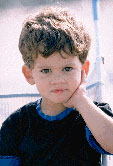
MONDAY, April 1 (HealthDay News) — Parent behavior training is an effective and well-studied intervention for preschoolers at risk of developing attention-deficit/hyperactivity disorder (ADHD), a new review shows.
Such programs seek to promote a positive relationship between the parent and child, and to teach effective discipline strategies that rely on rewards and non-punitive consequences.
“When we looked at studies with children with a cluster of disruptive behaviors, parent behavior training is a good strong intervention for behaviors like hyperactivity, impulsivity, temper tantrums and oppositional behavior,” said review author Dr. Alice Charach, head of the neuropsychiatry team at the Hospital for Sick Children in Toronto.
The drug methylphenidate (Ritalin, Methylin) may also be effective in this age group, although there was only one study that met the review’s standards, and American Academy of Pediatrics (AAP) guidelines don’t recommend medication for ADHD in preschool-age youngsters.
Results of the review were published online April 1 and in the May print issue of Pediatrics.
Diagnosing ADHD in preschool-aged children is possible, but it can be difficult, according to study background information. “Kids that age can be very busy and inattentive and distractible. It’s sometimes hard to have them do what they’re supposed to do,” Charach said. Parents may initially ask their doctor to evaluate their child because the kids have more disruptive, oppositional behaviors, she noted.
Once kids are diagnosed or found to be at high risk of developing ADHD, the most effective intervention hasn’t been clear.
To get a better idea of what might work best in these young children, the researchers reviewed the medical literature for studies on interventions for children younger than 6 who had behavior disruptive enough to be referred to treatment, or a diagnosis of ADHD, oppositional defiant disorder or a conduct disorder.
They found 55 studies that matched their initial criteria, and then they further reviewed the studies to assess factors such as sample size and study design. They found eight good studies on parent behavior training, and one study they considered good on medication.
The four parent interventions studied in this review were: the Positive Parenting Program, Incredible Years Parenting Program, Parent-Child Interaction Therapy and the New Forest Parenting Program.
Interventions that focus on changing parental behavior may seem like the blame is being placed on parents for their child’s behavior. But, Charach said, that’s not the case at all.
“Some kids are more challenging and need extra skills and extra support from their parents. And, this may not come naturally. We learn how to parent from our own parents. If a child isn’t like us, we might not know what to do,” she explained.
The researchers found that when parents completed the entire course, their children’s behavior improved more.
In the single study of medication, the researchers found that although methylphenidate could be effective for this age group, there were side effects from the drug.
“We live in an age when parents are sensitive to the whole issue of medications. I think it’s a natural fit for families to say, ‘What can we do instead?'” Charach said.
Plus, the AAP guidelines don’t recommend medication as a first-line treatment for children at risk of ADHD in this age group, she said.
A U.S. expert discussed the new findings.
“This review emphasizes the value and effectiveness of several different parent training programs to help families who have children who are behaviorally challenging,” said Dr. Andrew Adesman, chief of developmental and behavioral pediatrics at the Steven and Alexandra Cohen Children’s Medical Center of New York.
But, he said, it’s important to note that the researchers didn’t compare the interventions side by side. They only looked at studies that had been done on each particular intervention.
Adesman said another concern is that parent behavior training programs aren’t always available or possible for the parents to complete.
One relatively easy way for concerned parents to see if their youngster’s behavior is normal or a potential problem is to enroll them in preschool, he said. “Preschool provides a respite for parents, but it also offers peer modeling and gives parents and pediatricians a fresh perspective coming from experienced objective observers,” Adesman explained.
More information
Learn more about parent behavior training classes from the American Academy of Pediatrics.

